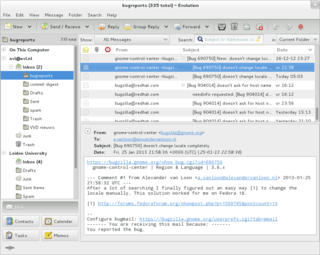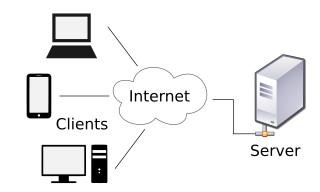Related Research Articles

Electronic mail is a method of transmitting and receiving messages using electronic devices. It was conceived in the late–20th century as the digital version of, or counterpart to, mail. Email is a ubiquitous and very widely used communication medium; in current use, an email address is often treated as a basic and necessary part of many processes in business, commerce, government, education, entertainment, and other spheres of daily life in most countries.

A web hosting service is a type of Internet hosting service that hosts websites for clients, i.e. it offers the facilities required for them to create and maintain a site and makes it accessible on the World Wide Web. Companies providing web hosting services are sometimes called web hosts.
A mailing list is a collection of names and addresses used by an individual or an organization to send material to multiple recipients. The term is often extended to include the people subscribed to such a list, so the group of subscribers is referred to as "the mailing list", or simply "the list".
Various anti-spam techniques are used to prevent email spam.

Email spam, also referred to as junk email, spam mail, or simply spam, is unsolicited messages sent in bulk by email (spamming). The name comes from a Monty Python sketch in which the name of the canned pork product Spam is ubiquitous, unavoidable, and repetitive. Email spam has steadily grown since the early 1990s, and by 2014 was estimated to account for around 90% of total email traffic.
Microsoft Exchange Server is a mail server and calendaring server developed by Microsoft. It runs exclusively on Windows Server operating systems.

Client is a computer that gets information from another computer called server in the context of client–server model of computer networks. The server is often on another computer system, in which case the client accesses the service by way of a network.
Apple Open Collaboration Environment (AOCE) is a collection of messaging-related technologies introduced for the Classic Mac OS in the early 1990s. It includes the PowerTalk mail engine, which is the primary client-side interface to the system, the PowerShare mail server for workgroup installations, and a number of additional technologies such as Open Directory, encryption, and digital signature support.
Trespass to chattels is a tort whereby the infringing party has intentionally interfered with another person's lawful possession of a chattel. The interference can be any physical contact with the chattel in a quantifiable way, or any dispossession of the chattel. As opposed to the greater wrong of conversion, trespass to chattels is argued to be actionable per se.
Email marketing is the act of sending a commercial message, typically to a group of people, using email. In its broadest sense, every email sent to a potential or current customer could be considered email marketing. It involves using email to send advertisements, request business, or solicit sales or donations. Email marketing strategies commonly seek to achieve one or more of three primary objectives: build loyalty, trust, or brand awareness. The term usually refers to sending email messages with the purpose of enhancing a merchant's relationship with current or previous customers, encouraging customer loyalty and repeat business, acquiring new customers or convincing current customers to purchase something immediately, and sharing third-party ads.
A dedicated hosting service, dedicated server, or managed hosting service is a type of Internet hosting in which the client leases an entire server not shared with anyone else. This is more flexible than shared hosting, as organizations have full control over the server(s), including choice of operating system, hardware, etc.
A shared web hosting service is a web hosting service where many websites reside on one web server connected to the Internet. The overall cost of server maintenance is spread over many customers. By using shared hosting, the website will share a physical server with one or more other websites.
Web analytics is the measurement, collection, analysis, and reporting of web data to understand and optimize web usage. Web analytics is not just a process for measuring web traffic but can be used as a tool for business and market research and assess and improve website effectiveness. Web analytics applications can also help companies measure the results of traditional print or broadcast advertising campaigns. It can be used to estimate how traffic to a website changes after launching a new advertising campaign. Web analytics provides information about the number of visitors to a website and the number of page views, or creates user behavior profiles. It helps gauge traffic and popularity trends, which is useful for market research.
Emailtracking or email tracker is a method for monitoring whether the email message is read by the intended recipient. Most tracking technologies use some form of digitally time-stamped record to reveal the exact time and date when an email is received or opened, as well as the IP address of the recipient.
Mobile marketing is a multi-channel online marketing technique focused at reaching a specific audience on their smartphones, feature phones, tablets, or any other related devices through websites, e-mail, SMS and MMS, social media, or mobile applications. Mobile marketing can provide customers with time and location sensitive, personalized information that promotes goods, services, appointment reminders and ideas. In a more theoretical manner, academic Andreas Kaplan defines mobile marketing as "any marketing activity conducted through a ubiquitous network to which consumers are constantly connected using a personal mobile device".
Shopping cart software is a piece of e-commerce software on a web server that allows visitors to have an Internet site to select items for eventual purchase.
A web beacon is a technique used on web pages and email to unobtrusively allow checking that a user has accessed some content. Web beacons are typically used by third parties to monitor the activity of users at a website for the purpose of web analytics or page tagging. They can also be used for email tracking. When implemented using JavaScript, they may be called JavaScript tags. Web beacons are unseen HTML elements that track a webpage views. Upon the user revisiting the webpage, these beacons are connected to cookies established by the server, facilitating undisclosed user tracking.

Kolab Now is a web-based email and groupware service, based completely on free and open-source software. It is owned and operated by Kolab Systems AG and was formerly known as MyKolab.
A data management platform (DMP) is a software platform used for collecting and managing data. DMPs allow businesses to identify audience segments, which can be used to target specific users and contexts in online advertising campaigns. They may use big data and artificial intelligence algorithms to process and analyze large data sets about users from various sources. Advantages of using DMPs include data organization, increased insight on audiences and markets, and more effective advertisement budgeting. On the other hand, DMPs often have to deal with privacy concerns due to the integration of third-party software with private data. This technology is continuously being developed by global entities such as Nielsen and Oracle.
Spy pixels or tracker pixels are hyperlinks to remote image files in HTML email messages that have the effect of spying on the person reading the email if the image is downloaded. They are commonly embedded in the HTML of an email as small, imperceptible, transparent graphic files. Spy pixels are commonly used in marketing, and there are several countermeasures in place that aim to block email tracking pixels. However, there are few regulations in place that effectively guard against email tracking approaches.
References
- ↑ Marcus Taylor (16 August 2019). "10 Best Email Marketing Software & Tools For Small Businesses of 2019". Venture Harbour.
- ↑ Kong, Ruoyan; Zhu, Haiyi; Konstan, Joseph A. (2021-04-13). "Learning to Ignore". Proceedings of the ACM on Human-Computer Interaction. 5 (CSCW1): 1–23. arXiv: 2006.16508 . doi:10.1145/3449154. ISSN 2573-0142.